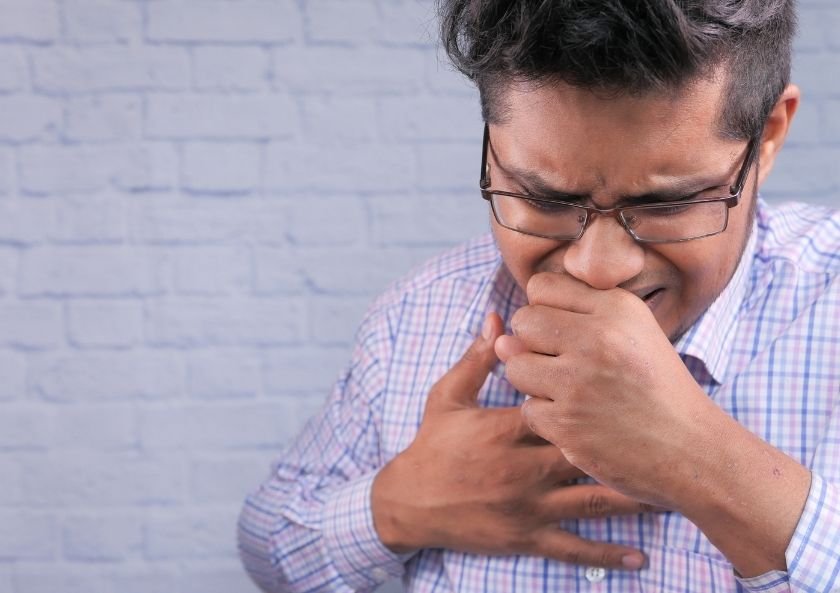Allergic asthma is a common lung disease that requires long-term and regular treatment. Allergic asthma symptoms usually start in childhood. Generally, the patient himself and/or his/her family have food allergies, allergic rhinitis, eczema, and allergic asthma. Bronchi are very sensitive in asthma. Triggers such as allergens (house dust, pollen, animal hair, dampness), viral infections, cigarette smoke and exercise cause contraction of the bronchus and inflammation in the bronchus (redness, swelling) and an increase in phlegm production.
What are the symptoms of allergic asthma?
Triggers in asthma (such as allergens, exercise, cigarette smoke) can be seen after exposure, coughing, wheezing while breathing, shortness of breath, and chest tightness. Symptoms vary from person to person.
What are the symptoms of allergic asthma in children?
The bronchi of asthmatic patients are extremely sensitive and even if the patient does not have any complaints, there is constant inflammation (redness, swelling) in the bronchi. Asthma symptoms begin in preschool period in children. Cough, wheezing, chest tightness and shortness of breath may be seen. Symptoms increase at night or early in the morning. The frequency and severity of the symptoms vary. Allergens such as house dust, pollen, animal hair, dampness, upper respiratory tract infections such as colds, air changes, laughing or crying, cigarette smoke and pungent smells such as perfume cause an increase in complaints. Childhood allergic asthma may be accompanied by signs of runny nose, itching, eye itching, tearing, sneezing, past or ongoing food allergy and eczema. Since asthma symptoms may occur more intensely in the presence of food allergy and eczema, patients should also be evaluated in this respect.
Does every child who cough suffers from asthma?
Cough is a common finding in children. However, not every coughing child has asthma. Your doctor can diagnose asthma with questions, examination findings and tests. In allergic asthma, the presence of allergic diseases in the family, allergic rhinitis, food allergy or eczema in the child, increase in cough with triggers and disappearance of complaints with asthma medications suggest the diagnosis of asthma. Cough that increases with exercise, laughing and crying at night or in the morning are also complaints seen in asthma.
- Reflux in the presence of symptoms such as vomiting, not gaining weight, bad breath,
- In case of persistent sputum cough, prolonged bacterial bronchitis, bronchiectasis (more than normal enlargement of the bronchial structures), immunodeficiency
- Sudden cough in case of choking while feeding or playing games,
- Laryngomalacia caused by congenital soft cartilage structure in case of wheezing that does not go away
- Growth and development retardation, continuous sputum cough, cystic fibrosis in the presence of foul smelling stool, nasal discharge, postnasal discharge due to increased discharge in the nose and sinuses in the presence of nasal discharge, throat clearing
What is the treatment for allergic asthma?
Although asthma cannot be cured completely, it can be controlled with the right treatment. The aim of the treatment is to prevent permanent damage to the bronchi by minimizing the risk of complaints and asthma attacks. First of all, the allergen (such as house dust) that causes asthma should be determined and the exposure should be eliminated and reduced. Medications used in asthma are divided into two as controlling and relieving medications.
Reliever drugs: Salbutamol-containing drugs correct bronchial constriction when coughing, wheezing and shortness of breath increase with triggers (such as animal hair).
Controlling drugs: These drugs called inhaled steroid (cortisone)
It improves the redness and swelling in the bronchi that cause the disease symptoms. It is important to use it regularly within the period recommended by your doctor.
The other controller is an oral drug called mon. This medication reduces swelling and redness in the bronchi.
If the allergen causing the symptoms in your child is determined by skin and blood tests, your doctor may recommend vaccination with this allergen, if deemed appropriate. This treatment can reduce the excessive response to this allergen in the body and improve asthma symptoms.
If your child has a recurrent or persistent cough, shortness of breath, wheezing and chest tightness, consult a pediatric allergist to be evaluated for allergic asthma.



